#balakirev
Text
RealityJunkies Ukrainian MILF Erotic Fucking
jack that dick daddy
Big ass thot pawg quick fuck
Gay sex with hitchhiker and naked masturbation movietures videos Ash
Hajimete No Gal Yukana Yame Hentai
Babe hitchhiking fucks for amateur casting
Two young teens and lesbian pussy eating face I had never even
Esposa culona en pantys puta
ANGELA WHITE - Busty Bikini Threesome with Violet Myers and Lena Paul
Teen girls stripping at party first time Mommy Loves Movie Day
#glaciating#glaucophane#Feinleib#reweave#adread#prosubscription#sclerectasia#pliancy#collimates#russelet#graved#semiroll#wlwoc#amiga#ankuses#barytophyllite#prevaricates#Balakirev#boulder-stone#BAO
0 notes
Text


С Рождеством🎄 от русских композиторов
#classic composers#classical composer fanart#igor stravinsky#dmitri shostakovich#sergey rachmaninoff#sergey prokofiev#pyotr tchaikovsky#rimsky korsakov#cezar cui#modest mussorgsky#aleksander borodin#mily balakirev
85 notes
·
View notes
Text

The Mighty Five
#classical music meme#classical composers#alexander borodin#mily balakirev#cesar cui#modest mussorgsky#nikolai rimsky korsakov
10 notes
·
View notes
Text


OTD in Music History: Historically important composer, conductor, orchestrator, arranger, pianist, pedagogue, music critic, and cultural icon Mily Balakirev (1837 - 1910) is born in Russia.
In the late 1850s and early 1860s, Balakirev brought together a group of composers who became known as "The Mighty Handful" or "The Mighty Five." This group consisted of Alexander Borodin (1833 - 1887), Cesar Cui (1835 - 1918), Modest Mussorgsky (1839 - 1881), and Nikolai Rimsky-Korsakov (1844 - 1908).
For several years, Balakirev (at that time the only professional musician in the bunch) served as the group's de facto leader. In that capacity, he imbued his students with a musical philosophy that was consciously predicated on a novel sense of Russian Nationalism. This approach continued to undergird their respective musical philosophies long after he himself abandoned the group in 1871.
While Balakirev was something of a despot and his methods could be downright dictatorial, the impressive results he achieved were undeniable: Working under Balakirev's guidance, "The Mighty Five" produced a string of masterpieces which quickly established its members' reputations both individually and as a collective.
Balakirev also performed a similar service for Pyotr Tchaikovsky (1840 - 1893) on at least two occasions: In 1868–69 with the fantasy-overture "Romeo and Juliet," and then again in 1882–85 with the "Manfred Symphony."
Unfortunately, as a composer, Balakirev himself worked very slowly, and frequently took many years to complete major works... by which time they were generally deemed "old fashioned" and received rather coolly by the public...
One notable exception to this unfortunate pattern was his "oriental" fantasy "Islamey" (1869) for solo piano, however, which Balakirev composed quickly in a burst of inspiration and which proved to be an immediate and enduring hit on the concert stage.
PICTURED: A c. 1910 real photo postcard, showing the young Balakirev as he would have appeared right around the time that he was leading "The Mighty Five."
#classical music#music history#composer#classical composer#classical studies#maestro#Mily Balakirev#virtuoso#classical#classical piano#classical musician#classical musicians#classical history#historian of music#history of music#musician#musicians#music theory
3 notes
·
View notes
Text
youtube
Mily Balakirev (1837—1910) - Symphony No. 1 in C Major (1864-1897)
1. Largo – Allegro vivo (0:00) 2. Scherzo. Vivo – Poco meno mosso – Tempo I (13:29) 3. Andante (20:45) 4. Finale. Allegro moderato (35:23)
City of Birmingham Symphony Orchestra conducted by Neeme Järvi
2 notes
·
View notes
Text

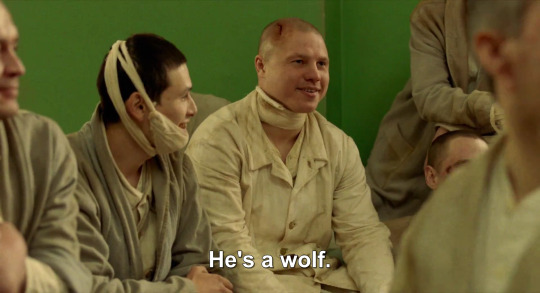



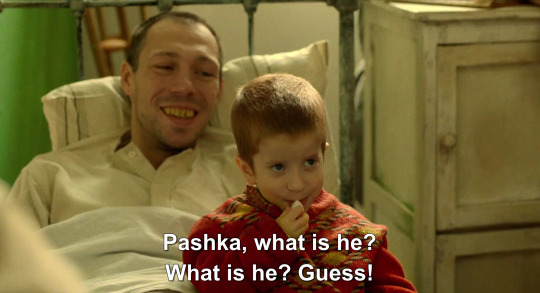
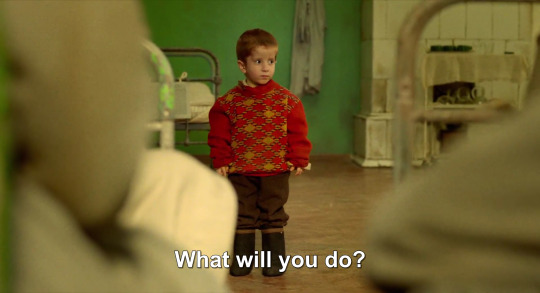
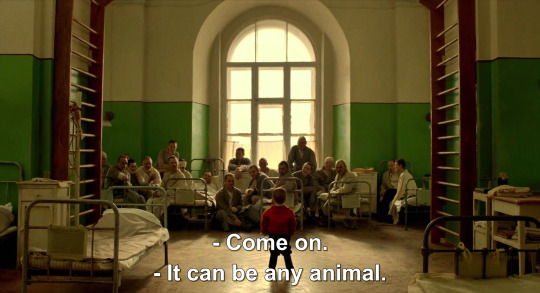
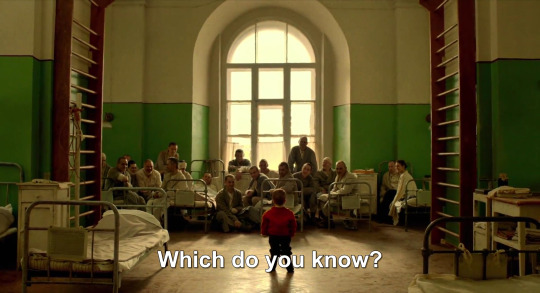

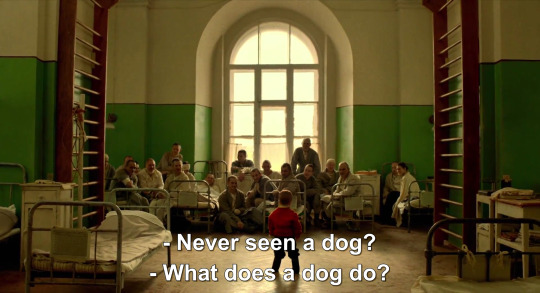
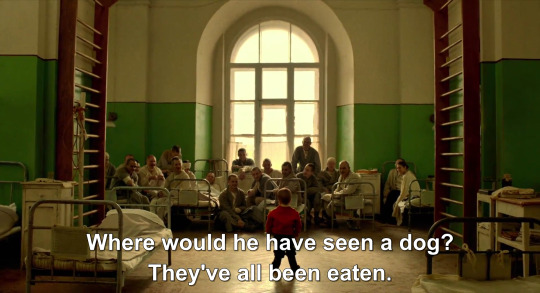
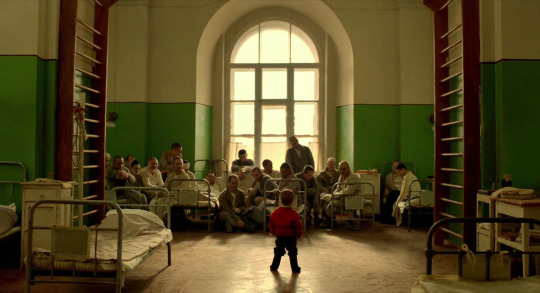
Дылда, 2019
#drama#war#Дылда#beanpole#dylda#kantemir balagov#aleksandr terekhov#timofey glazkov#konstantin balakirev#absence#THIS MOVIE#this brilliant brilliant movie
0 notes
Text
Islamej
Milij Alekseevič Balakirev (2 gennaio 1837 - 1910): Islamej, fantasia orientale op. 18 (1869). Boris Berezovskij, pianoforte.
youtube
View On WordPress
0 notes
Text

was watching a video where someone overlayed liszt's hungarian rhapsody no. 2 and balakirev's islamey and this comment is the funniest shit ever
1 note
·
View note
Text

Morning Doodle: “They’d gathered in the war room this morning, and Nikolai had called for coffee instead of tea. He’d developed a taste for it during his university days in Ketterdam. Though, between his exhaustion and the headache that had plagued him since the incident in Balakirev the previous night, he wouldn’t have minded something stronger in his cup.” (Leigh Bardugo’s King of Scars CH 9)
#zoyalai#nikolai lantsov#zoya nazyalensky#king of scars#rule of wolves#grishaverse#leigh bardugo#nikolai duology#shadow and bone
232 notes
·
View notes
Text
Days in the Sun
Pairing: Aleksander Morozova x GN!Reader
Summary: On a warm summer day, you sit on the lawn of the Little Palace with your friends, and become distracted by the sight of the General.
My Masterlist
»»---------------------►
The sun casts a comfortable glow over your skin as you run your fingers through the neatly trimmed grass beneath you. Genya had offered you a place next to her on the picnic blanket, but you’ve always loved sitting in the grass on a sunny day. It reminded you of summers in Keramzin, when there was enough daylight for you to spend nearly the entire day outside and avoid the rest of the orphanage.
Nadia turns the page of her book, her brows crinkled with confusion as she reads the words in front of her. She asks a question and Marie attempts to answer her. Nadia has her Advanced Grisha History test coming up, and History has never been a strong point for either of the girls. You can’t suppress the fond smile on your face as they mix up a variety of different events and dates.
Genya lifts a hand to shield her eyes from the sun, and glances over the lawn of the Little Palace to look at the small group attempting to clear some of the trees and bushes near the entrance.
Her eyes are mostly focused on David, as he attempts to explain to Ivan how to use the new garden blades he had designed. With the increasing heat, and the steadily rising afternoon sun, the majority of those working on the gardens have abandoned their keftas in a few small piles dotted around.
A bright smile fills your features as you spot Fedoyr jogging over to you. He’s not wearing his kefta, and his once white shirt is now covered in several smudges of dirt and grass stains. He even has a leaf stuck in his hair.
Fedoyr flops dramatically onto the ground beside you with a heaving sigh. He rests his head in your lap, as the girls around you chorus their greetings to him.
“Having fun?” You ask him with a smile, which he returns with his usual cheery expression.
“A lot more now.” He remarks, lifting his head up to look back across the lawn. You follow his gaze, and see Ivan wiping the sweat from his brow as he talks with David. Ivan’s frown is deeper than usual, so he’s no doubt confused by David’s explanations, which brings a smile to your face.
“Not that I’m eyeing your husband, but I see your point.” You tease with a small laugh, to which Fedoyr grins up at you.
You pick the leaf out of his hair, and Genya asks him how the work is progressing.
“It’s going well so far. It was good of the General to help us out.”
You lift your head up immediately, eyes searching through the group for Aleksander. You’re so busy looking for him, that you miss the look shared between your friends.
Then you spot him.
He’s abandoned both his kefta and tunic, so he’s dressed the same as everyone else. His shirt hangs loose, despite the breeches settled on his shoulders. His hair is messy, as it always is when he’s been running his fingers through it. You watch him lift a large piece of tree trunk onto the back of a nearby cart, and for some reason his strength surprises you.
“Your heart’s beating faster.” Fedoyr observes, and you shoot a sharp look at him. Marie and Nadia giggle at your reaction, and your cheeks feel hot regardless of the summer heat.
Shyly, your gaze returns to Aleksander, only to find him already looking in your direction. Even from this distance, you can see the corner of his lips quirk in a smile. Fedoyr raises a brow at you, no doubt in reaction to the flutter of your heart, as Aleksander begins to approach your group.
Everyone greets him politely as he stands in front of you all. He asks Nadia about her studying, and Marie about her extra combat sessions. He talks to Genya about her upcoming trip to Balakirev, and tells Fedoyr that his other half was wanting him, to which Fedoyr sits up from his position in your lap.
Then Aleksander’s eyes settle on you, and he says your name softly.
“I’m taking a walk around the lake. Would you care to join me?”
“I’d love to.”
You smile at your friends, before taking Aleksander’s arm and heading along the path that leads to the lake. Your group continues to watch the two of you for a long moment.
“Have they admitted it yet?” Nadia asks. Marie looks at her with a small frown,
“Admitted what?”
“That they’re in love with each other.”
“Oh, I don’t think so.”
Genya shakes her head,
“We would know if they had.” To which Fedoyr nods in agreeement.
“It will happen soon enough. Just look at them.”
Genya hums as the rest of them watch you, tucked into Aleksander’s side despite the heat. Even from such a distance, they can all see how relaxed their General seems, with a wide smile on his face as he looks at you.
“Almost as bad as you and Ivan.” She teases, and it’s Fedoyr’s turn to blush.
Marie sighs, resting her chin on her knees as she watches you and the General as you near the lake, and she admires the romantic silhouette the two of you make.
#the darkling#the darkling x reader#the darkling x you#the darkling x y/n#the darkling au#aleksander morozova x reader#aleksander morozova#general kirigan#general kirigan x reader#shadow and bone x reader#shadow and bone au
396 notes
·
View notes
Text
so im working on a pretentious, i mean, JP themed playlist, and i really wanted to throw in a composer with the same initials as a joke
which is why Johann Pachelbel and Jean-Philippe Rameau have infiltrated this playlist despite having no other relevance to his character;;;
speaking of, here's what i got so far:
J. Pachelbel - any fugue, just... anything that isn't Canon in D
J.P. Rameau - Les Indes galantes, Forêts paisibles
(but this rock cover specifically)
Sergei Prokofiev - Romeo and Juliet, No. 14 Dance of the Knights
(stolen from another JP playlist you know who you are lmao. it gets bonus points for being from a ballet)
Sergei Rachmaninoff - Piano Concerto No.2 in C minor, Op. 18
(there's a reason it's popular!! and i like the strings in it!!)
Dmitri Shostakovich - Waltz No.2
(another popular one. it's a pretty tepid choice i admit)
Nikolai Rimsky-Korsakov - Scheherazade, Op.35
(this one's pretty well known too. apparently there's optional yelling in the 4th movement?? gets bonus points for being a ballet)
Aram Khachaturian - Masquerade Suite
(another popular one, especially the Waltz, which fits him rather well. though i also like Nocturne and Mazurka. apparently there's a ballet of this so that's bonus ballet points)
Khachaturian - Gayane, Sabre Dance
(I'M KIDDING. but a JP hater would have chosen this)
Khachaturian - Gayane, Dance of the Comrades
(since i do not hate him, i'm replacing the previous with this from the same ballet. and ofc, bonus ballet points)
Pyotr Ilyich Tchaikovsky - The Nutcracker, Arrival of Drosselmeyer
(there was a whole thing on Twitter about how JP's smile resembles a nutcracker, so this was obvious. Uncle Drosselmeyer as a character is rather JP-esque as well, at least, when he's pretending to be nice)
Alexander Mosolov - Iron Foundry
(referenced in JP's win quote to Zangief: "Seeing you, I can't help but recall Mosolov's Iron Foundry, tovarisch.")
Mosolov - Two Nocturnes, Op. 15
(it's really unsettling! and reminded me of JP's introduction scene in World Tour, with the horror elements)
Igor Stravinsky - The Firebird, The Infernal Dance of King Kastchei
(bonus ballet points, and for sharing names with his j.HK)
(honorable mention to Petrushka, another ballet, but it isn't exactly 'JP'. but i like Danse Russe so, i'm mentioning it lmao)
Alexander Scriabin!!! - everything!!!
(recently discovered for me and im in love. there's a whole collection made by Dmitri Alexeev of all his works, and i can totally see JP doing paper work with it playing in the background)
this list is already too long, but here are some extra notes:
Rimsky-Korsokov was part of 'The Mighty Five', also including Modest Mussorgsky, Mily Balakirev, Cesar Cui, and Alexander Borodin. This was a historically and musically significant group, which is why I wanted to at least name drop them.
Actually, it was looking into Mosolov that sent me down the rabbit hole regarding similar Soviet-era composers. Obviously there's a lot going on here with the... artistic (and political) censorship at the time.
Or, all of interesting stuff going on with composers finding influences from traditional folklore/ dances. Or alternatively, responding to and processing contemporary events through music, as a form of subtle protest...
But I've only glossed over these topics so I'm going to refrain from going too deep on it;;
As for connecting all this to JP, gosh idk, these comic pages from Vol. 3 and 4 seem relevant. I'll let these stew as a final thought:

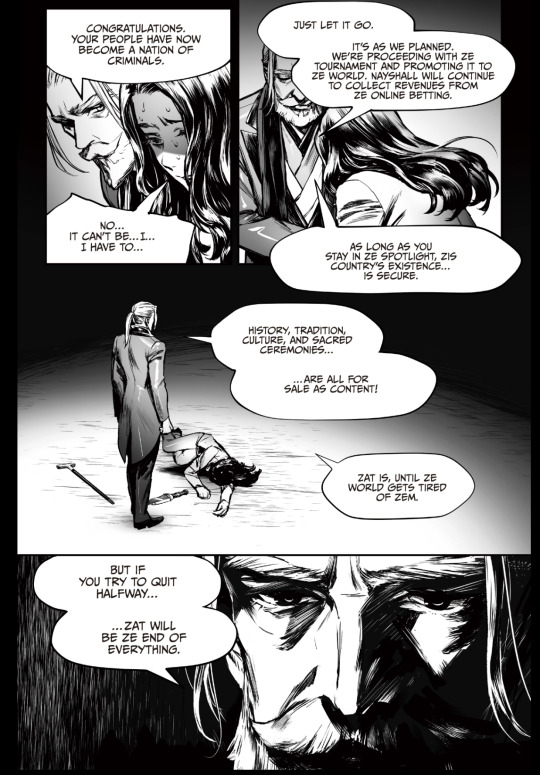
#jp rambles#maybe i shouldve made an actual playlist with videos#but i did NOT do that haha#have fun looking them up
14 notes
·
View notes
Note
russian opera recs???? please??????? I want to broaden my horizons
I am so excited that you're interested!!! You are in for such a treat.
I did a write-up of my favorite Russian operas yesterday evening, which is here. I gushed a whole bunch about my faves and recommended a handful of specific tracks on Spotify to get a feel for things. So definitely check that out.
Buuuuut since you've given me another opportunity here-- let's talk about the New Russian School. This is the music of Tolstoy and Dostoyevsky-- what they and their characters listened to.
The New Russian School was a 19th century movement among composers to create a distinctly Russian style of music. It was spearheaded by the Mighty Five, a group of five composers including my beloved Modest Mussorgsky (my top two on the opera post are his work). But they didn't just write operas! They also wrote parlor songs, symphonies, ballets, marches-- you name it. If you want to get a real feel for Russian music, this is where you start. Some highlights:
- All of Mussorgsky’s Pictures at an Exhibition is wonderful, but “The Great Gate of Kiev” is just grand and magnificent and magical in all the best ways. I swear, it makes me want to weep for joy.
- "The Field Marshall," part of Mussorgsky's Songs and Dances of Death, is sung from the perspective of Death riding through a battlefield after a battle. It's everything you want from that evocative premise.
- "Russia," Mily Balakirev is a symphonic piece that's meant to try and encapsulate the Russian identity. It's beautiful: moody in places, sprightly in others, dramatic, languid, mercurial. Surprisingly good study music, somehow?
- “Islamey” from Balakirev’s Oriental Fantasy is reasonably well known in the West, but it’s so much fun. That’s all I’ve got to say about it. It totally slaps.
- “The Lark” from A Farewell to Petersburg (also Balakirev) is just so sweet and sad and delicate. It settles my heart so wonderfully.
- Rimsky-Korsakov's Russian Easter Overture is just glorious. It's the sort of music that grows in beauty and hope from its first strains. It's sunrise on Easter and everyone waking up and getting dressed and going to church. It's mounting excitement of Easter morning and the joy of celebrating the Resurrection.
- Parlor music! You know how in Tolstoy novels a character (or several) will sing something at a private party or gathering? That’s this stuff. Alexander Dargomyzhsky’s is some of the best. I quite like “Enchant Me, Enchant” because I can so easily imagine Natasha singing it. “The Old Corporal” is quite good too. Full disclosure, I mostly listen to Dargomyzhsky while thinking about Tolstoy novels ;)
- A wonderful cello nocturn by Alexander Borodin. Mournful, but with moments of joy and lightness. Perfectly balanced. My mom really likes this one.
Oh goodness, Cesar Cui is the last member of the Mighty Five and I can’t think of anything of his that I really love off the top of my head. So sorry Cesar! I should listen to more of your stuff.
-Tchaikovsky came after the Mighty Five, but was definitely a product of the New Russian School and I need to talk about his Sixth Symphony. His Sixth Symphony (called Pathetique) is popular in the West, but not many know the story and significance behind it. Tchaikovsky was coming to the end of his life and old St. Petersburg was coming to the end of its. Pathetique quotes from the Russian Orthodox funeral service. Its last movement incorporates De Profundis, a prayer for the dead. The Symphony is beautiful and mournful and, when it premiered, the curtain fell not to applause but to weeping. The Grand Duke Konstantin Konstantinovich ran up to Tchaikovsky crying "What have you done? It's a requiem, a requiem!" Ya know that scene in the movie Amadeus where Mozart writes his own death mass in bed and then dies? Yeah. Except in a way, this was a requiem for the Russia that died with the revolution as well. Tchaikovsky was a lot like Akhmatova in that he looked at Old Russia with nostalgia before it was even gone.
Bonus: I like bombast. Here's Glinka's Patriotic Song. Glinka predates all these other guys, but he's wonderful and really deserves to be better known in the West. In Russia, he's like their Mozart.
Between this and the opera post, I hope I haven’t overwhelmed anyone. During quarantine, I used to go for drives with my mom and sister basically every day. Occasionally, I played my Russians and my mom’s response was “this makes the pandemic feel a lot more epic, doesn’t it?”
#i could go on#just. Russia man#russia where are you flying to?#how can i keep from singing#ask me hard questions
100 notes
·
View notes
Text
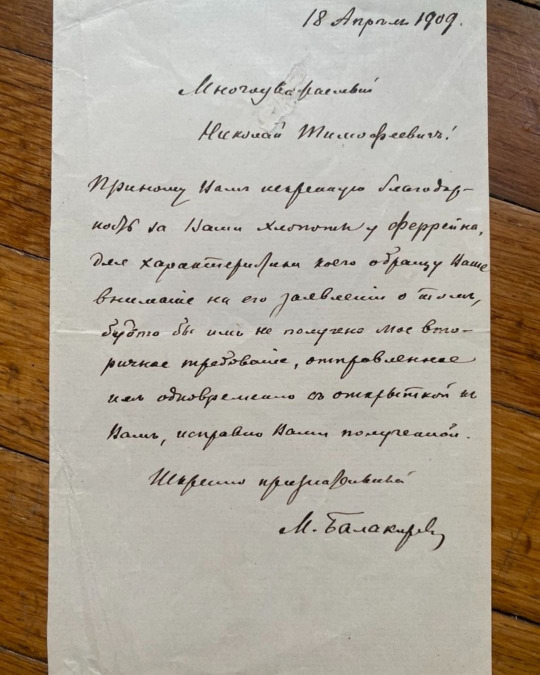
OTD in Music History: Composer, conductor, orchestrator, arranger, pianist, pedagogue, and cultural icon Mily Balakirev (1837 - 1910) is born in Russia.
In the late 1850s and early 1860s, Balakirev brought together the composers now known as "The Mighty Handful" or "The Mighty Five," which included Alexander Borodin (1833 - 1887), César Cui (1935 - 1918), Modest Mussorgsky (1839 - 1881), and Nikolai Rimsky-Korsakov (1844 - 1908). For several years, Balakirev, at that time the only professional musician in the group, served as its de facto leader -- imparting to the rest of his budding compatriots a musical philosophy consciously predicated on a novel sense of Russian Nationalism which continued to underlie their thinking long after he himself subsequently left the group in 1871. While his methods could frequently be dictatorial, the results were undeniable: Under his stern guidance, "The Mighty Five" produced a number of works which established its members' reputations, both individually and as a group. Balakirev also notably performed a similar function for Pyotr Tchaikovsky (1840 - 1893) on two separate occasions during Tchaikovsky's career – in 1868–69 (with the fantasy-overture "Romeo and Juliet") and in 1882–85 (with the "Manfred Symphony").
As a composer, Balakirev himself worked very slowly, and he frequently took many years to complete his own major works (by which time they were generally deemed to be "old fashioned" and received rather coolly by the public). The notable exception to this unfortunate pattern was his oriental fantasy "Islamey" for solo piano, which Balakirev composed quickly in a burst of inspiration and which proved to be an immediate and enduring hit with virtuoso pianists.
PICTURED: A handwritten letter by Balakirev, dated to the year before his death and regarding various medical matters.
2 notes
·
View notes
Text
youtube
Mily Balakirev (1837-1910) - Piano Concerto no.1 in f-sharp minor, op.1
Anastasia Seifetdinova, piano
Russian Philharmonic Orchestra, Dmitry Yablonsky
2 notes
·
View notes
Text


forever ago
a darklina fic
complete | multi-chapter | explicit | 38k
soulmates | cottagecore | angst | best friend’s daughter | father’s best friend | age difference | slow burn
If you asked anyone in the town of Balakirev about Aleksander Morozova and Anatoly Starkov, they would claim that the boys were inseparable, twin flames, each a shadow to the other. With their matching dark eyes and mops of dark hair, they were even mistaken as brothers often enough. It is technically untrue, though neither boy would deny it.
They say blood is thicker than water, but amongst the moon and the sun and the Earth beneath their feet, each boy knows that a drop of scarlet is just that and nothing more.
Aleksander is holding his newborn goddaughter when he makes the devastating discovery that she is his soulmate.
ao3 link in reblog
36 notes
·
View notes